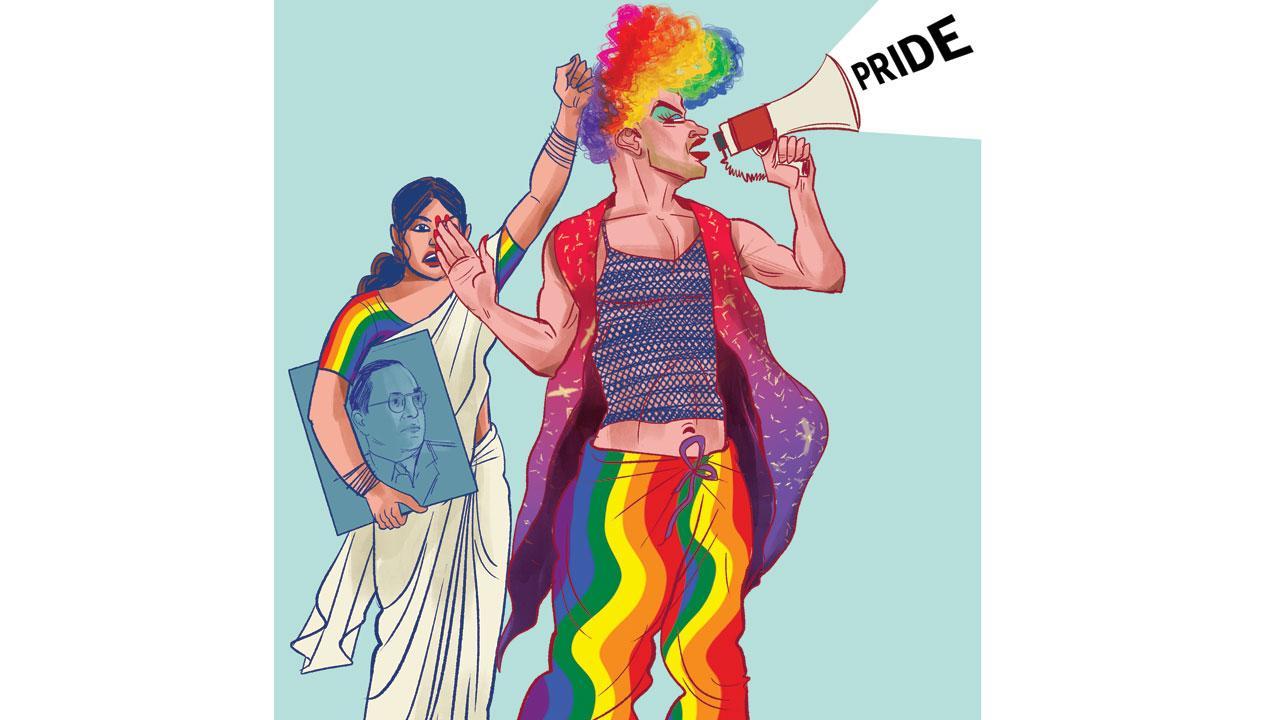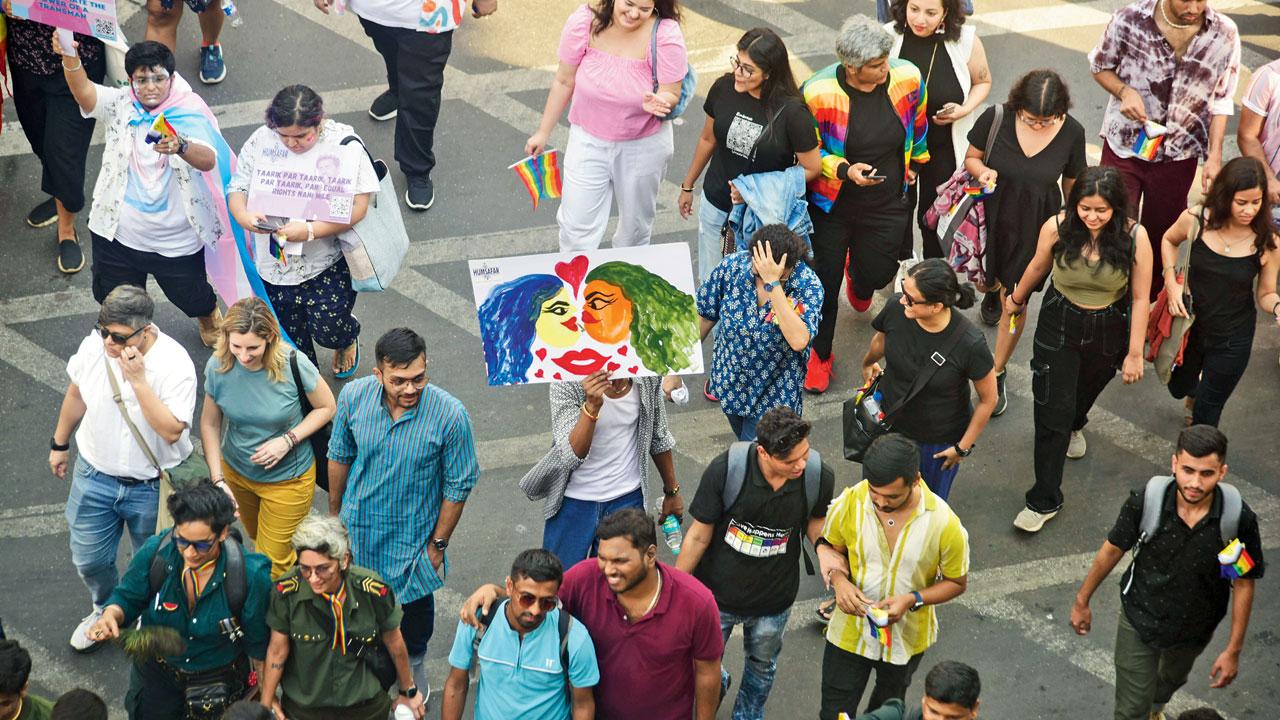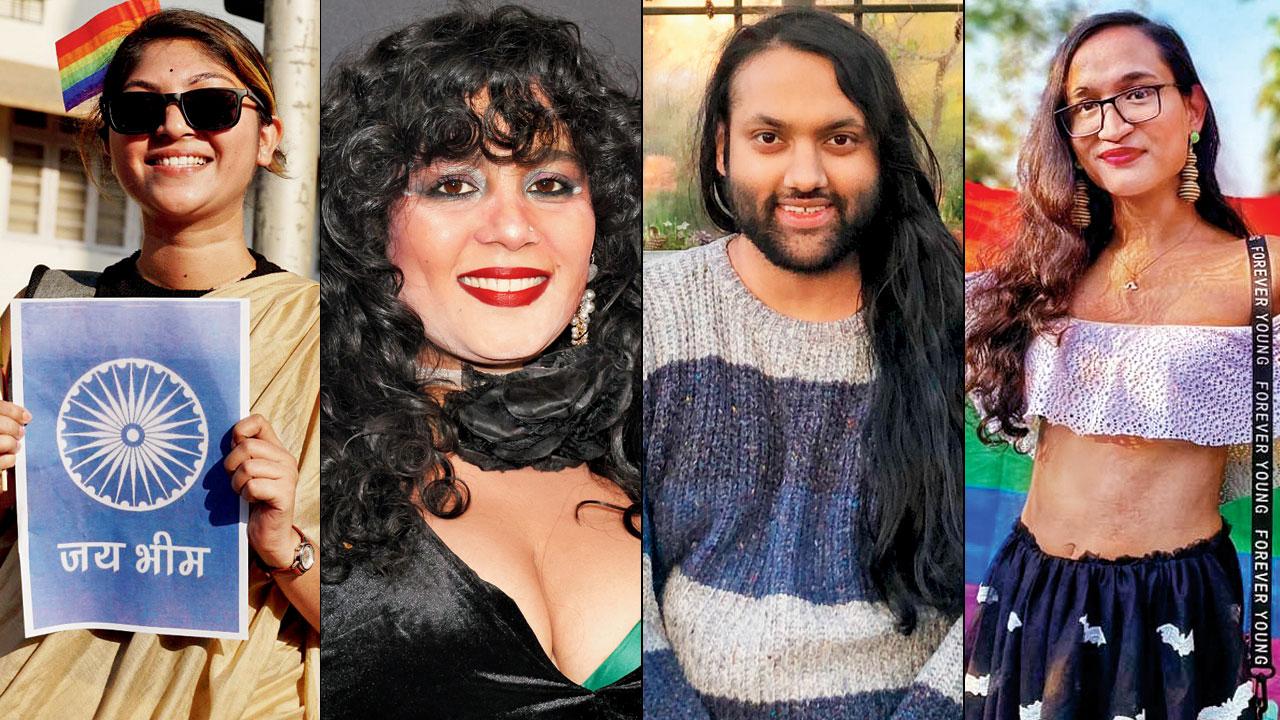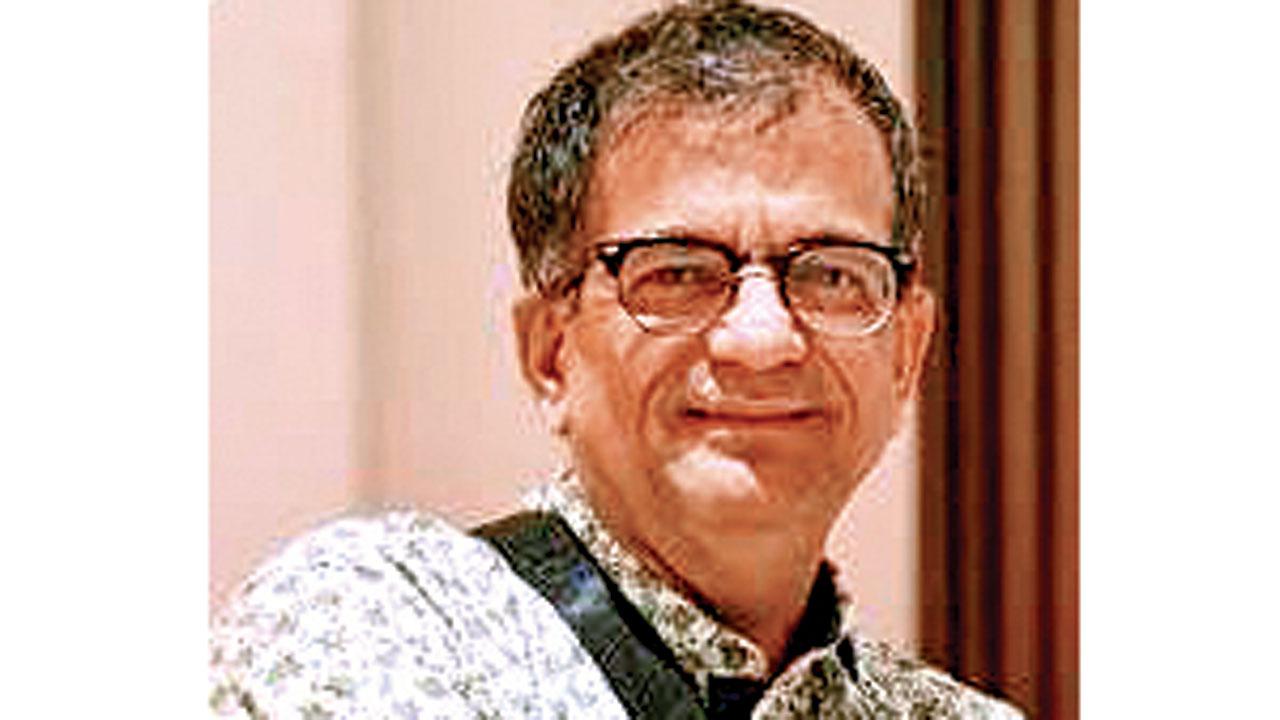The face-off at the Pride March last week has brought a debate to flash point: Do queer places in the city hold space for their Dalit/Ambedkarite stakeholders?

The recent incident at the Mumbai Pride March where four queer Dalit individuals were asked to stop chanting Jai Bhim has reignited the debate over the lack of inclusivity in mass queer mobilisation movements. Illustration/Uday Mohite
Mayura Saavi, a queer Ambedkarite, was running late on Saturday afternoon for the Pride March that was finally taking place after a gap of four years. Her three friends—two women and a man, all Dalit, queer and in their early 20s—were waiting for Saavi partly because she was the only one who had attended Pride before.
ADVERTISEMENT
The group made their way towards August Kranti Maidan by 3.30 pm; the march was 30 minutes underway and the band of friends were eager to make up lost ground. One of the friends, a 23-year-old illustrator, says they were handed rainbow flags and banners which they felt didn’t represent them accurately. “It said something like ‘I am gay and that’s okay’ or ‘It’s okay to be Bi’,” says the woman who identifies as Dalit queer. “It felt apolitical, when other Pride marches are more inclusive. We thought it needed more meaningful and representative banners. We looked for a printing shop along the route, and found one on Grant Road. We printed posters of Babasaheb (Dr Bhimrao Ambedkar) and wrote ‘No queer liberation without caste annihilation’ on chart paper.”

Holding up two posters of Dr Ambedkar and three saying Jai Bhim, the group rejoined the march. The fresh attendees were too self-conscious to shout slogans asserting their Dalit queer identity. “But then I felt we couldn’t keep marching silently just because we were scared about how people might react,” says the illustrator. “Eventually a friend of mine and I began shouting Jai Jai Jai Bhim (a call for caste solidarity), and soon all four of us were chanting it. I could hear people from afar joining in, but the sloganeering was not consistent because there were only four of us.”
Soon they encountered the first of many impediments in their march: Saavi says a badge-wearing transwoman volunteer from the Humsafar Trust stopped them saying, “Mi pan Jai Bhim aahe pan tumhala kalala pahije kuthe kai karaicha” (I too am an Ambedkarite, but you must know what to express, where). “She said something along the lines of ‘This is not a political march’ by which we were initially surprised, but tried to explain that queerness cannot exist without politics,” says Saavi. The volunteer countered by asking whether they would brandish a rainbow flag at the April 14 march which commemorates Dr Ambedkar’s birth anniversary.

The Mumbai Pride March was welcomed back with open arms after a gap of four years. Many queer activists said that its absence was leading to the disbanding of many micro-movements and that it is essential to keep track of the injustices are suffered by individuals in isolation
The episode came to a sombre end when an unidentified man grabbed the hand of another woman in Saavi’s group, and tried to snatch away Dr Ambedkar’s poster. The woman wasn’t surprised: “The queer movement in the city feels like a very Savarna space. In fact, most of our cis/queer Dalit friends had forewarned us not to march, anticipating such treatment.” She requested us to not give away any identity markers in this piece, fearing backlash. “The next day, many famous individuals from the queer community used our incident to either express solidarity publicly or declare how inclusive the march was. All without giving us a call to ask what really happened.”
Saavi says this is why representation matters all the more at such “Savarna-heavy” spaces. “Traditionally,” she points out, “we’ve always lived on the margins of cities and villages; we’ve never been included. Is it always going to be like this? We need to build alliances, and the onus of annihilating caste is not on those who are oppressed, but on those who created the system. They should know that we occupy the same space as them, even physical space such as the Pride March. We have to fight this fight from within; you have to acquire your space.”
Saavi confesses that in her formative years, she believed caste annihilation was a bigger fight than gender equality, but lately she has realised these wars cannot be fought in isolation. “As they say: Zaata zaat nahi, ashi ti hi zaat (your caste follows you even in death). It is easy for people to accept gender and sexuality, but not
caste,” she says.

Mayura Saavi, Yashica Dutt, Aroh Akunth and Anjali Siroya
Vivek Anand, Chief Executive Officer of The Humsafar Trust and a member of Mumbai Queer Pride (MQP) March expresses regret. “We apologise to the Dalit queer people who came to the march and faced a kind of harassment that we at Humsafar have zero tolerance for,” he requested mid-day to convey, “As soon as the incident came to light, one of our officers went to the spot and sorted it out. Our trust comprises of 70 per cent Dalit queer people and we consider our Constitution as our guiding force. Humsafar didn’t get any support when we started our work in 1994, it was the Dalit queer who stood by us.
Hence, we are very disturbed by this incident.” Anand adds that the trust and MQP will sensitise its volunteers on non-negotiables at the Pride walk next year. “We had put out a call for volunteers and around 60 queers and allies underwent a three-hour training session for the march. Next year, we aim to set up a committee comprising Dalit queers and other minorities to sensitise every volunteer on these nuances.”
Anjali Siroya, a trans Dalit person who works with Humsafar Trust, ascribes to Saavi’s strategy of fighting the caste battle from within queer spaces. “It is true that management bodies of large queer organisations or queer spaces in general are dominated by Savarna gay men,” she says. “This is why I work with Humsafar; where majority of the queer individuals come from lower caste communities and I want to make more safer spaces for Dalit queers like myself and bring more awareness. I have never faced any casteism within the organisation, but that doesn’t make any other queer spaces Dalit inclusive.” “We need management positions in these spaces,” Saavi holds, “not remain foot soldiers all our lives. And if you enter this space as a Dalit queer, you have to be aware of how you are being used as well.”

Vivek Anand
Dalit queer activist Yashica Dutt’s book ‘Coming out as a Dalit,’ that won her the Sahitya Akademi Award in 2020, makes her one of the most important Dalit queer voices of our time. Dutt, an alum of Columbia School of Journalism has always spoken about how her queerness is continuously invalidated as her Dalit identity makes her more palatable to the world. “I am angry, disappointed and disgusted by the incident,” she told us telephonically from New York. “At the same time, I am not surprised that a mainly Sarvana queer space is hostile to the presence of Dalits. That is the reality of being Dalit and queer in Indian spaces. Just because someone is queer, or whatever on the gender and sexuality spectrum they identify with, does not mean they can be less casteist unless they have done the work to overcome it.”
Responding to how Saavi and her friends were repeatedly told not to politicise the march, Dutt says, “It is laughable that queer spaces cannot be political because they are inherently just that. The history of queerness is that of a fight for political identity; the right to be themselves. Wherever queer people have risen and asked for their rights has been a political event. This is ignorance and wilful blindness to
queer history.”
On the subject of whether Dalit queers should participate in mainstream queer places and events, Dutt weighs in saying: “They should very much be a part of such spaces, while safety for Dalit queer people is paramount especially with the threat of hostility and violence, there is also need for Dalit queer people to be part of these spaces. It is not a Pride March, if there is no Dalit queer presence. These [then will not be] are not safe spaces for us. If we are grabbed by the hand, tomorrow it could escalate to something else. That signals to us that they do not see Dalit people as a part of this group or movement. They don’t want them to express pride in the way that comes naturally to them.”
Aroh Akunth of the Dalit Queer Project says, “It is not a question of whether caste belongs in Pride, or what queer organising could look like—rather it exposes the politics of Pride committees and public spaces in India at large that pretend to change, but not really. It shows that ideas of progress are often built on violence against the marginalised.” They add that many Dalit queers have criticised the depoliticisation of Pride before. “It’s (pride’s) capture by capitalism and respectability politics, gentrification that passes off as aesthetics. It reflects in the fact that we spend so much of our economic resources on organising marches once a year rather than invest in building social and political work that benefits the community year-round. What has been the response of the organisers? To sanitise, co-opt, police the counter public rather than imagine otherwise.” Akunth holds that as a society, we are only interested in consuming the violence Dalit queer folk are subjected to rather than engage with the questions they pose.
 Subscribe today by clicking the link and stay updated with the latest news!" Click here!
Subscribe today by clicking the link and stay updated with the latest news!" Click here!








